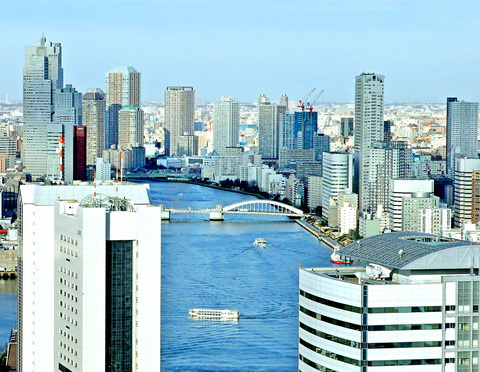Sleek metallic towers are shooting up into the cramped Tokyo skyline as a real estate boom is engulfing the capital just over a decade after Japan's asset bubble burst.
Driven by rising demand for US-style real estate investment trusts and funds and an influx of people back into the cities, developers are vying over premium land to build on or buying up office towers, condominiums, shopping malls and hotels.
This was reflected in the latest annual government survey, which showed that residential land prices in central Tokyo had risen for the first time in 17 years and commercial land prices had posted their first gain in 14 years.

PHOTO: AFP
Since the towering 54-story Roppongi Hills office and residential complex gave a glitzy facelift to an old bar district a few years ago, the development zeal has spread to the Tokyo Bay area.
The Shiodome towers on former rail yards along the bay are now home to the electronics giant Matsushita, Japan's top advertising agency Dentsu and other big names.
Masato Kawamura, a television advertising writer at Dentsu, is typical of the young executives working in Shiodome and living in a condo in a neighboring town like Shinagawa, another hot-spot for bay-area development.
"The rush of development in our neighborhood has completely changed our view. We cannot see the horizon from our 13th floor balcony any longer," Kawamura said.
The current boom has some rationale as it is based on an expected steady flow of rents in central Tokyo rather than on the wildly speculative real-estate buying that triggered the asset inflation of the 1980s.
But some analysts warned the optimism might be on shaky ground.
"Ten years ago everybody had had enough with real estate investments," said analyst Yasuo Ide, referring to the sudden collapse of land prices that plunged Japan's economy into a deflationary spiral.
"Now foreign investors and newcomers to the real estate market who have not had their fingers burnt are rushing in without thinking of potential risks," said Ide, who heads his own real-estate investment research company.
Nevertheless he predicted continued growth in fairly new Japanese real estate investment trusts, called J-REITs, for the next three years to ?5 trillion (US$48 billion), more than double the current value.
The REITS were introduced as part of financial deregulation and were eyed as a stimulant for a stagnant real estate market, helping banks slash the cost of bad loans made with land as collateral.
Developers unload risk and recoup their original investment in land and buildings by listing them as a trust on the open market, which investors buy into on the prospect of regular rental returns and potential profits from property resale
Although the average return has fallen to 3.7 percent from 4 to 5 percent, the J-REIT market still yields much higher returns than 1.5 percent on 10-year Japanese government bonds and near zero percent in term deposits.
But analysts warned that Japan's current boom could get out of hand.
"I think there is a relatively high risk of investing in J-REITs because they are not very liquid," said Eric Perraudin, managing partner of Japan Management Consulting Partners.

The CIA has a message for Chinese government officials worried about their place in Chinese President Xi Jinping’s (習近平) government: Come work with us. The agency released two Mandarin-language videos on social media on Thursday inviting disgruntled officials to contact the CIA. The recruitment videos posted on YouTube and X racked up more than 5 million views combined in their first day. The outreach comes as CIA Director John Ratcliffe has vowed to boost the agency’s use of intelligence from human sources and its focus on China, which has recently targeted US officials with its own espionage operations. The videos are “aimed at

STEADFAST FRIEND: The bills encourage increased Taiwan-US engagement and address China’s distortion of UN Resolution 2758 to isolate Taiwan internationally The Presidential Office yesterday thanked the US House of Representatives for unanimously passing two Taiwan-related bills highlighting its solid support for Taiwan’s democracy and global participation, and for deepening bilateral relations. One of the bills, the Taiwan Assurance Implementation Act, requires the US Department of State to periodically review its guidelines for engagement with Taiwan, and report to the US Congress on the guidelines and plans to lift self-imposed limitations on US-Taiwan engagement. The other bill is the Taiwan International Solidarity Act, which clarifies that UN Resolution 2758 does not address the issue of the representation of Taiwan or its people in

US Indo-Pacific Commander Admiral Samuel Paparo on Friday expressed concern over the rate at which China is diversifying its military exercises, the Financial Times (FT) reported on Saturday. “The rates of change on the depth and breadth of their exercises is the one non-linear effect that I’ve seen in the last year that wakes me up at night or keeps me up at night,” Paparo was quoted by FT as saying while attending the annual Sedona Forum at the McCain Institute in Arizona. Paparo also expressed concern over the speed with which China was expanding its military. While the US

SHIFT: Taiwan’s better-than-expected first-quarter GDP and signs of weakness in the US have driven global capital back to emerging markets, the central bank head said The central bank yesterday blamed market speculation for the steep rise in the local currency, and urged exporters and financial institutions to stay calm and stop panic sell-offs to avoid hurting their own profitability. The nation’s top monetary policymaker said that it would step in, if necessary, to maintain order and stability in the foreign exchange market. The remarks came as the NT dollar yesterday closed up NT$0.919 to NT$30.145 against the US dollar in Taipei trading, after rising as high as NT$29.59 in intraday trading. The local currency has surged 5.85 percent against the greenback over the past two sessions, central